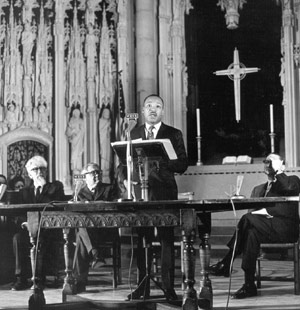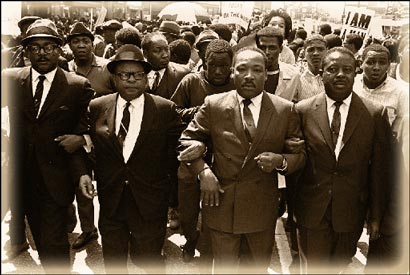Martin Luther King, III
Speaking truth to poverty: Cabinet post could at last spur measurable results
 It has been 40 years since the last sermon my father gave at the National Cathedral in Washington, when he called upon our nation's leaders to eradicate poverty once and for all, explaining that, "There is nothing new about poverty. What is new is that we now have the techniques and the resources to get rid of poverty. The real question is whether we have the will."
It has been 40 years since the last sermon my father gave at the National Cathedral in Washington, when he called upon our nation's leaders to eradicate poverty once and for all, explaining that, "There is nothing new about poverty. What is new is that we now have the techniques and the resources to get rid of poverty. The real question is whether we have the will."
Today, as our nation continues to be plagued by a poverty that is inexcusable when coupled with record riches amassed by the wealthy, the challenge that consumed my father toward the end of his life has remained comfortably entrenched within the realm of rhetoric and not action.
I therefore call upon all our presidential candidates to take a vow that, within the first 100 days in office as commander in chief, he or she will appoint a cabinet-level officer whose responsibility will be to make a measurable impact on eradicating poverty and allow more Americans to move up into our middle class.
A poverty cabinet member is necessary today more than ever. Our next president will be taking over a government that faces virtually the exact same poverty rate my father found so appalling back in 1968. The U.S. Census Bureau reports the current poverty rate is just over 12 percent, as it was in 1968, while the number of people living in poverty has grown from 25 million to more than 36 million, including 12 million children. Even worse, a family of four with two children and an annual income of $21,027 is not even considered poor by our government's reporting standards. Many people have become immune to these statistics, but we cannot wait for another Katrina to truly grasp that America is awash in poverty.
The work of the cabinet officer must transcend the ceremonial. His or her principal focus must be highlighting successful programs working at the local level, developing new, more accurate measurements for poverty, and setting benchmarks for success by which the administration will be judged.
We can look to the leadership of Mayor Michael Bloomberg for developing the Office of Financial Empowerment within the Department of Consumer Affairs of New York City, which utilizes strategic partnerships and innovation to educate, empower and protect low-income New Yorkers. Going far beyond New York's model, the national poverty office would investigate public policy that could boost income, increase savings, encourage asset building, protect consumers and work to bring about systemic change in the war on poverty. An emphasis would be placed on coordinating with the public, private and civic sectors to develop institution-based and action-oriented solutions while setting measurable benchmarks for success. This isn't just about speeches. Just as America created a middle class through deliberate action once before, we can take the steps to restore opportunity to all our citizens again. 
Finally, the office would develop more accurate measurements for poverty that wouldn't overlook the family of four barely surviving on $21,000 a year. With real data, the office can generate meaningful reports on the causes and effects of poverty that will raise the profile of poverty as a national issue and highlight successful anti-poverty policies that can be promoted to Congress, the president and the public. In a nation heavily influenced by our market-based principles, we pay attention to what we can count. So it's time to start counting correctly.
My father spent his life in the trenches of a war that poses a true threat to our peace and security as a nation. He fought the war on poverty with the sanitation workers in Memphis, and he was moved to continue that fight as he witnessed barely clothed children in Marks, Miss., and a mother in Newark, N.J., raising her children in a rat-infested apartment.
Four decades have come and gone, but as I have traveled the country continuing the fight on poverty, I have seen firsthand that the poverty remains the same.
I urge our nation, our citizens, our businesses, our government and our presidential hopefuls to remember my father's caution in his final sermon: There is no such thing as a conscientious objector in the war on poverty.
Martin Luther King, III: Author Bio | Other Posts
Posted at 11:29 AM, Apr 04, 2008 in
Civil Rights | Welfare | public services
Permalink | Email to Friend










